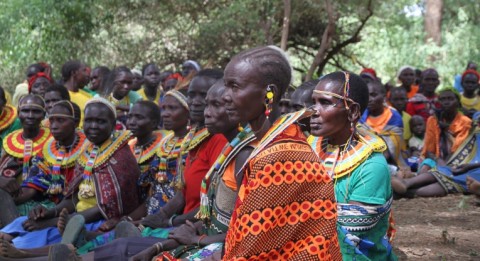The problems of Northern Kenya arise from poverty
The biggest problem of the five provinces of Northern Kenya is poverty. This was the conclusion made in a meeting between four northern governors in Nairobi. The meeting was summoned and hosted by Finn Church Aid, who also showed preliminary results from a risk analysis it had done in the northern parts of Kenya. Kimmo Kiljunen, a special representative for mediation of the Foreign Ministry of Finland, was also present. Kiljunen had visited the northern parts of Turkana and Pokot earlier in the week.
“Poverty in Northern Kenya means lack of water, and thereof food. In addition to this lack of basic necessities, the areas also suffer from lack of schools, illiteracy and lack of knowledge. Health care and basic security are almost completely non-existent“, Washington Okeyo, a representative of Southlink Consultion Agency, listed the findings of the research.
The field workers of Southlink have visited all the provinces and there were dozens of crisis hot spots in each.
“Even though the disputes of the north often highlight different regional and territorial disagreements, there are several underlying reasons in affect, according to the preliminary findings of the research. In most cases, resources, or to be more exact, the lack of them is the main reason“, Okeyo concluded.
Because of these reasons, cattle theft is the main form of livelihood in many places. Hundreds of people die each year because of them. Even though the weapons are temporarily buried to the ground, they are quickly dug up.
The governor of Isiolo, Godana Doyo, agrees with the results of the risk analysis.
“Peace is the first thing on our agenda“, he said and hoped that the governors are included in peace work.
The governor of Marsabit, Ukur Yatani, brought up the fact that there are also differences between the northern provinces.
“Twelve of the fourteen communities of Marsabit are nomadic. This causes different kinds of structural problems, when designing for example peace promoting basic services“, Ukur Yatani said.
Central government is far away
The governors of the north expressed their discontent towards the central government.
“The Northern provinces are forgotten and we don’t receive anything from the government“, Josphat Nanok Koli, a governor of Turkana, stated.
The scope for action of local government is limited, when there no money coming from Nairobi. According to Koli, the biggest problem also in Turkana is lack of safety, law enforcement and punishments.

Many women in Northern Kenya counties are widowers because of violent cattle theft. Women participate actively in community meetings where peace building is discussed.
“There are a lot of widows. The men of two thirds have died as a result of cattle thefts“, he said.
Wajir, Kenya’s most Eastern province, is susceptible to the influences of neighboring Somalia.
“As stated before, small personal weapons are threat to safety. We are also threatened by large weapons. Every time something happens in Somalia, it affects us“, governor Ahmed Abdullahi Mohamad said.
All the governors expressed their desire to cooperate with REGAL-IR – project. Kimmo Kiljunen told about the long and diverse achievements of Finland’s international peace work and hoped these experiences could also be used in Northern Kenya.
Since this year’s February, Finn Church Aid has been a part of an extensive developmental consortium, REGAL-IR, which aim is to improve the living conditions of the North. The project is being led by Adeso, African Development Solutions, and funded by USAID. Finn Church Aid carries out peace work in the project.
Text and photos: Hilkka Hyrkkö
Finn Church Aid (FCA) is implementing the peace component of a larger program “Resilience and Economic Growth in the Arid Lands – Improving Resilience” (REGAL-IR) by the consortium led by Adeso, African Development Solutions and funded by USAID.